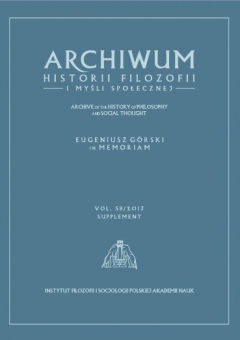Znaczenie praksis w teologii wyzwolenia i w narodnictwie. Zarys analogii
The Meaning of Praxis in Liberation Theology and in Narodnism. Drawing Analogies
Author(s): Tomasz SikoraSubject(s): Theology and Religion, Marxism, Socio-Economic Research
Published by: Instytut Filozofii i Socjologii Polskiej Akademii Nauk
Keywords: Narodnism; liberation theology; praxis; Marxism; revolution; capitalism; anthtropological optimism;
Summary/Abstract: Although Russian narodnism (in its broader, Berdyaevian sense) arose over 100 years before Latin American theology of liberation and in different historical context, we can still draw some interesting analogies between them. Both narodnism and liberation theology were based on moral-driven critics of the current socioeconomic conditions. Both searched for the quickest solution to the problems of poverty and massive inequality, and found it in revolution. The revolution was the most radical consequence of the concept that Russians and Latin Americans both shared: the concept of praxis, which I don’t interpret in its strict Marxian sense, but as a commitment to a cause of liberation. Marxism was widely discussed, sometimes even accepted by the narodniks or by the theologians but its importance laid in its usefulness at war with capitalism. The latter is being accused of causing poverty and inequality. The pressure for the commitment to the cause of liberation was probably incited by some sort of sense of guilt also shared by both sides. The Narodniks were mostly intellectuals who benefited from the work of peasants and labourers, while the liberation theologians might have felt that preaching while people die of hunger is an act of hypocrisy. Finally, both sides also shared certain kind of anthtropological optimism.
Journal: Archiwum Historii Filozofii i Myśli Społecznej
- Issue Year: 2013
- Issue No: 58supl.
- Page Range: 277-294
- Page Count: 18
- Language: Polish

